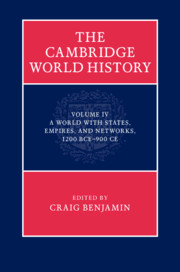Book contents
- The Cambridge World HistoryVolume IV
- The Cambridge World History
- A World with States, Empires, and Networks, 1200 bce–900 ce
- Copyright page
- Contents
- Figures
- Maps
- Tables
- Contributors
- Preface
- 1 Introduction: the world from 1200 bce to 900 ce
- Part I Global histories
- 2 Global economic history
- 3 The gendering of power in the family and the state
- 4 Slavery
- 5 The Axial Age in world history
- 6 Developments in science and technology c. 800 bce – c. 800 ce
- 7 Discourses on gender and sexuality
- 8 Art
- 9 Pastoral nomads
- Part II Trans-regional and regional perspectives
- Index
- References
2 - Global economic history
from Part I - Global histories
Published online by Cambridge University Press: 05 May 2015
- The Cambridge World HistoryVolume IV
- The Cambridge World History
- A World with States, Empires, and Networks, 1200 bce–900 ce
- Copyright page
- Contents
- Figures
- Maps
- Tables
- Contributors
- Preface
- 1 Introduction: the world from 1200 bce to 900 ce
- Part I Global histories
- 2 Global economic history
- 3 The gendering of power in the family and the state
- 4 Slavery
- 5 The Axial Age in world history
- 6 Developments in science and technology c. 800 bce – c. 800 ce
- 7 Discourses on gender and sexuality
- 8 Art
- 9 Pastoral nomads
- Part II Trans-regional and regional perspectives
- Index
- References
Summary
- Type
- Chapter
- Information
- The Cambridge World History , pp. 29 - 54Publisher: Cambridge University PressPrint publication year: 2015
References
Further Reading
- 4
- Cited by

